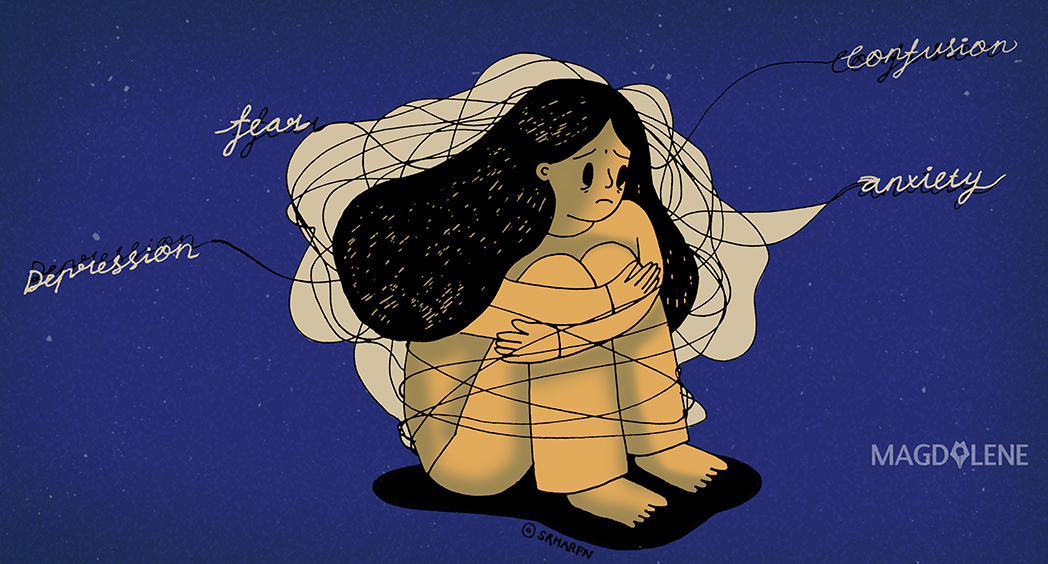Dec. 26, 2004, a phone conversation with my mother abruptly ended. She had just said that a very powerful earthquake rocked my hometown for 10 minutes and that she had never experienced such an earthquake before. Still, everything was all right back home, she assured me. Later I found out the quake was 9.0 on the Richter scale and triggered what is now known as the Boxing Day tsunami that devastated the province of Aceh and affected at least 14 other countries.
I was pursuing a BA degree in Political Science, majoring in International Relations, at a private university in Yogyakarta at the time, and the final term was just around the corner. The first TV news I watched covered only the pre-event of the tsunami in Aceh Utara, about a five-hour drive from my own hometown of Banda Aceh.
Later that day I received a call from my older sister, who lived in Jakarta. She couldn’t reach any of our family members back home; none of the landlines nor cell phones were working. I decided to leave for Jakarta, thinking that if nothing serious happened back home, I still had a few weeks to get back to Yogyakarta for my finals.
Hours later when I met my sister, she broke another news. Still not knowing what happened after the quake, Mama had succeeded to make a short phone call to her sister in Medan to tell her she survived the disaster and had taken a refuge somewhere. But she couldn’t save our youngest brother. She held my brother in her hands, but a strong wave broke her grips and carried my brother away with it.
The news tore my heart into pieces. I had a close relationship with my younger brothers, especially the youngest, with whom I had a 16-year age gap. When Odhye was born, my dad was 52 years old, so I promised myself that I would take care of his future if my dad would be too old for it. My dear Odhye was just five years old when the tsunami hit.
I told my sister that whatever it took, I had to go home as soon as possible. She called her military husband frantically to find a plane ticket for me the next morning. He sent his subordinate, a military police, after breakfast, who assured my sister and I that we would get the ticket on the spot for the airplane as the they usually gave priorities to military officers on duty or their families. The waiting at the Soekarno-Hatta Airport felt like forever, while I still couldn’t get hold of my family.

The Search for Tsunami Survivors
I touched down at Iskandar Muda Airport at 6 p.m. on Dec. 28, and there I was greeted with more devastating news about my family from my uncle. No one knew the whereabouts of my mom and dad, my older sister, and two younger brothers. But my older brother survived and was staying at my aunt’s.
It was a chaotic and an emotional situation. Everyone cried when they saw me and I was overwhelmed. Though it seemed like the worst might have happened to the rest of my family, I didn’t want to kill the hopes that we’d find them alive.
My elder brother recounted the tragic event when I finally met him. Apparently, soon after the earthquake, he and Papa went on a motorbike to check our workshop because people had told them that some part of the workshop collapsed. So they left Mama, my older sister and my two younger brothers at home.
But things went too fast. They were never able to return home as giant waves hit, pulling them in different directions. He told me what sounded like the final moment of Papa’s life when the later told my brother to take care of Mama and the younger siblings.
Also read: Washed Away, Rescued, Kidnapped and Struggling: A Tsunami Survivor's Life
I had no words to describe the pain that tore me apart. It felt as if my future had been seized from me at that moment. He was the only male figure in my life that never failed me. The only person who told me to always fly higher and to never allow anyone to break my wings.
I started the search for my family members on Dec. 29. Our village and the neighboring villages were devastated. What were previously residential neighborhoods had all been wiped out and you could now see all the way to the sea. It was unimaginable. And to think of all the lives lost. Everywhere was covered with debris. A coconut tree stuck on the roof of what remained from our two-story house.
I met a neighbor who survived the disaster, and he told me that my mom was staying with other displaced people at Blang Bintang, an area near the airport. Without knowing precisely this place, I headed there. On the way, I saw another neighbor who told me that Mama was staying in his relatives’ house and took me there.
When I saw her, she was inside a rented bus, preparing to travel to Medan to meet her siblings. She had assumed no one of her family in Banda Aceh had survived. She couldn’t believe her eyes when she saw me and repeatedly asked me, “Is it you, Icha?”
I told her some of her younger siblings survived and that one of her sisters, my aunt who lived in Ie Masen Kayee Adang was totally safe because the water didn’t reach her house. I told her that her mother, my grandmother, and his oldest son, my brother, survived and she should come home with me to meet them all. She was so weak to process everything that I told her.
There were times when I planned to take my life away. The only thing stopping me from committing suicide was the promise I made to Papa that I would get my degree.
The scene of the reunification broke my heart again. There were ten survivors among us: my grandmother, Mama, my older brother, a cousin, my uncle and his wife and two daughters, another uncle and his wife. We cried listening to stories of survival. We cried over the unknown: what happened to the six family members who were still missing?
Dec. 30, I roamed around Banda Aceh to find antibiotics for my brother. He had injured his foot with a sharp object. Mama was not well either; she had mud in her lungs. All the health facilities I went had run out of antibiotics. Back at my aunt's house, I made a decision that Mama and my brother had to travel to Medan so they could get medical treatment.
I prepared them to travel on Dec. 31, the day my Mama turned 46, but they could only make it to Bireuen, as my brother started to fall very sick. A good friend of our extended family in Bireuen, took very good care of him. The infection almost killed him, but he survived. Once my brother was healthy enough to travel for eight hours long, I told them to continue all the way to Medan so Mama could get her treatment.
I stayed in Banda Aceh to continue my search for the missing family members. My aunt and her husband had gone to identify corpses that were to be buried in the first mass burial and they confirmed that they saw none of our family. Not knowing the magnitude of the disaster, I told myself that there was a bigger chance to find them alive.
Also read: How the Tsunami Brought Me Home to Rebuild It
I visited almost every shelter, asking if there were tsunami survivors from my village. If people said “yes,” then I would find the survivors to ask whether or not they knew about my family. I checked so many body bags, again, to no avail.
I had mixed feelings of things I could not understand and unable to give names for. When I didn’t find them among the body bags, hopes would start to rise in me, but when I couldn’t find their names among the survivors at shelters, all my hopes were dashed.
After staying in Banda Aceh for two weeks, I headed to Medan, where I stayed for two days. My aunt helped me get a plane ticket to go back to Yogyakarta, where I had to sit for my finals.
Tsunami Trauma Management
Once back in Yogyakarta, I couldn’t study at all. Every time I started reading something, I would break into tears. My breath felt heavy. I felt lost and unable to go on with my daily routine as a student.
Still, I was determined to sit for the exams. But I underestimated my situation. As soon as I finished reading the questions, my eyes blurred and I started crying uncontrollably. I would leave before the exam supervisors distributed the attendance list to be signed, so my attendance was never recorded in all of the exams.
With the help of a friend, the Dean granted me deferral. But all exams had to be taken before the midterm of the next semester. I worked very hard to put myself together again to meet the deadline.
It was around this time, that I felt overwhelmed with sadness and began to get suicidal. I felt powerless and hopeless to deal with the pain and I had no help whatsoever. Some who knew about my situation told me to surrender to God. If only it was that easy. Every day I struggled to get up from the bed. I begged God to give me power to hold on to life just for that day. The same plea I would repeat every morning for the next one and a half years.

There were times when I planned to take my life away: electrocuting myself with a hair dryer in the bathroom, taking insecticide, or running towards a moving truck. In those times, the only thing stopping me from committing suicide was the promise I made to Papa that I would get my degree. I had to hang on for the other two semesters.
I also nearly dropped out because I could not afford to pay the tuition anymore. But I begged another friend to try to speak to the rector, to give us tuition waivers. The rector later announced a tuition waiver for us until the eighth semester. I kept my words and completed my BA in 3.5 years, or seven semesters.
After graduation I went back home to work, thinking it could begin my healing process. Though it did help stop me from being suicidal, I still had no appetite and the acute insomnia persisted.
Also read: Horror and Hopes in the Tsunami Aftermath - 10 Years On
Post-Trauma Prolonged Grief
Today, I am still stuck, not knowing how to move forward with the loss and grief. I never stopped praying to Almighty Allah to give sign(s) of my family members’ whereabouts, but I am probably too numb to understand the signs that had come my way long time ago.
Three hours of uninterrupted sleep is the longest I could have every night. Some nights remain sleepless. I eat less these days, and my body takes the brunt of this, feeling exhausted during the day.
Often, I lie about my background to people. If they knew I was from Aceh, I feel emotionally incapable to handle their questions about the disaster.
I wish I could get help: an empathetic help to empower me to move forward. It’s unbearable. I can’t stand this anymore. The acute insomnia and lost appetite had triggered other physical pains. I have been suffering from lower back pain since 2009 and my immune system is so low that I am always prone to allergies that would trigger my asthma.
I wish those who don’t know how to handle my pain would just be silent rather than saying words or sharing thoughts that do not help.
I wish people would learn how to stop asking unnecessary questions related to the tsunami because lying about my background gets tiring.
I wish people would understand that all the prayers, fasting and Quran reading that I’ve done have not given me comfort and healing.
I wish people would understand why I never make it home anymore to celebrate the end of Ramadan because it gets so unbearable.
I wish I know how to move forward from this prolonged grief.







Comments